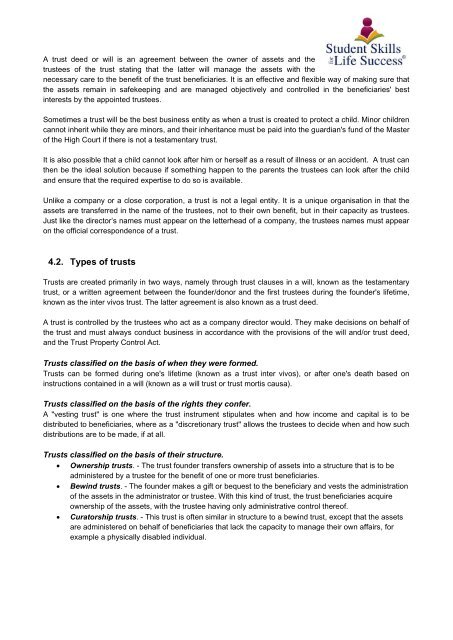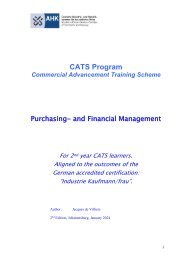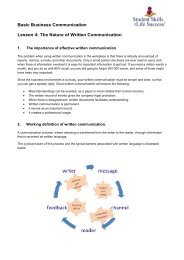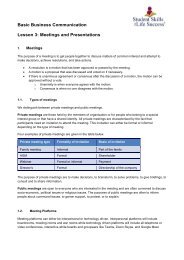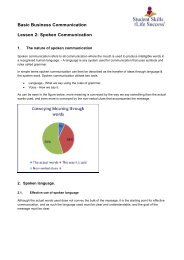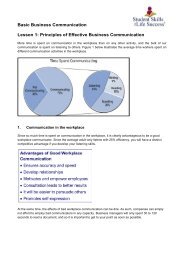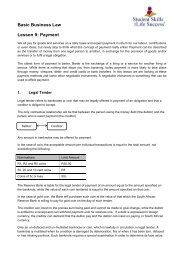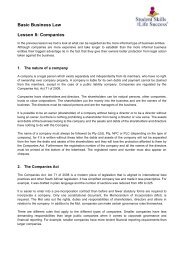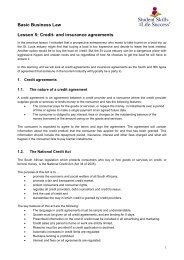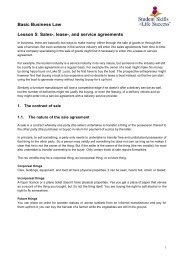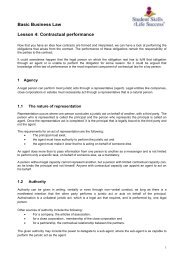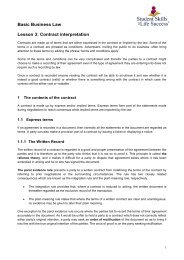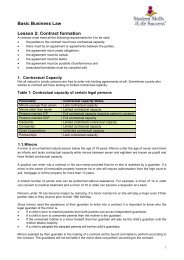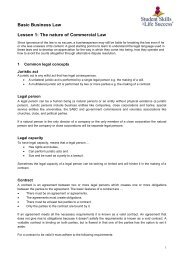Basic Business Law. Lesson 7. Smaller Business Entities
This is the seventh lesson of the "Student Skills for Life Success" "Basic Business Law" course. The topics covered in this booklet are: 1. Sole Traders 2. Partnerships 3. Close corporations 4. Trusts 5. Franchise Agreements
This is the seventh lesson of the "Student Skills for Life Success" "Basic Business Law" course. The topics covered in this booklet are:
1. Sole Traders
2. Partnerships
3. Close corporations
4. Trusts
5. Franchise Agreements
You also want an ePaper? Increase the reach of your titles
YUMPU automatically turns print PDFs into web optimized ePapers that Google loves.
A trust deed or will is an agreement between the owner of assets and the<br />
trustees of the trust stating that the latter will manage the assets with the<br />
necessary care to the benefit of the trust beneficiaries. It is an effective and flexible way of making sure that<br />
the assets remain in safekeeping and are managed objectively and controlled in the beneficiaries' best<br />
interests by the appointed trustees.<br />
Sometimes a trust will be the best business entity as when a trust is created to protect a child. Minor children<br />
cannot inherit while they are minors, and their inheritance must be paid into the guardian's fund of the Master<br />
of the High Court if there is not a testamentary trust.<br />
It is also possible that a child cannot look after him or herself as a result of illness or an accident. A trust can<br />
then be the ideal solution because if something happen to the parents the trustees can look after the child<br />
and ensure that the required expertise to do so is available.<br />
Unlike a company or a close corporation, a trust is not a legal entity. It is a unique organisation in that the<br />
assets are transferred in the name of the trustees, not to their own benefit, but in their capacity as trustees.<br />
Just like the director’s names must appear on the letterhead of a company, the trustees names must appear<br />
on the official correspondence of a trust.<br />
4.2. Types of trusts<br />
Trusts are created primarily in two ways, namely through trust clauses in a will, known as the testamentary<br />
trust, or a written agreement between the founder/donor and the first trustees during the founder's lifetime,<br />
known as the inter vivos trust. The latter agreement is also known as a trust deed.<br />
A trust is controlled by the trustees who act as a company director would. They make decisions on behalf of<br />
the trust and must always conduct business in accordance with the provisions of the will and/or trust deed,<br />
and the Trust Property Control Act.<br />
Trusts classified on the basis of when they were formed.<br />
Trusts can be formed during one's lifetime (known as a trust inter vivos), or after one's death based on<br />
instructions contained in a will (known as a will trust or trust mortis causa).<br />
Trusts classified on the basis of the rights they confer.<br />
A "vesting trust" is one where the trust instrument stipulates when and how income and capital is to be<br />
distributed to beneficiaries, where as a "discretionary trust" allows the trustees to decide when and how such<br />
distributions are to be made, if at all.<br />
Trusts classified on the basis of their structure.<br />
• Ownership trusts. - The trust founder transfers ownership of assets into a structure that is to be<br />
administered by a trustee for the benefit of one or more trust beneficiaries.<br />
• Bewind trusts. - The founder makes a gift or bequest to the beneficiary and vests the administration<br />
of the assets in the administrator or trustee. With this kind of trust, the trust beneficiaries acquire<br />
ownership of the assets, with the trustee having only administrative control thereof.<br />
• Curatorship trusts. - This trust is often similar in structure to a bewind trust, except that the assets<br />
are administered on behalf of beneficiaries that lack the capacity to manage their own affairs, for<br />
example a physically disabled individual.


